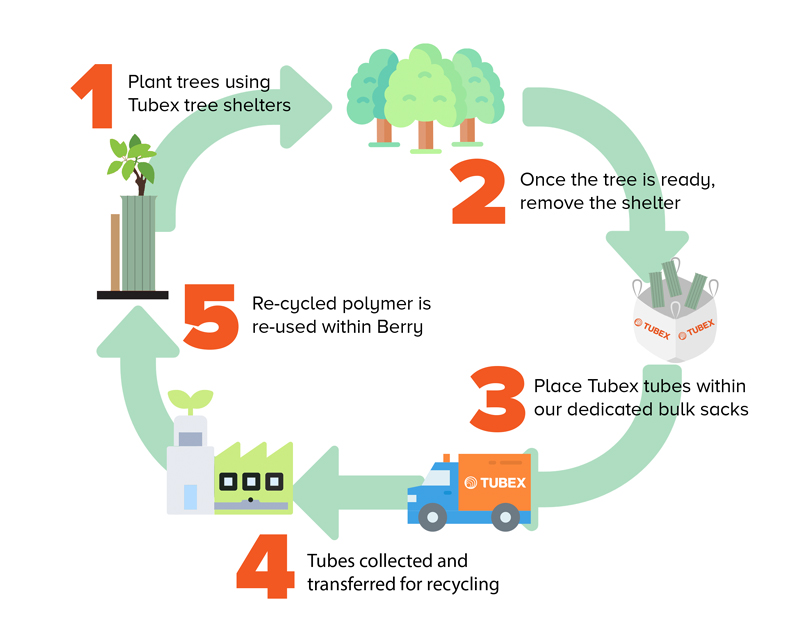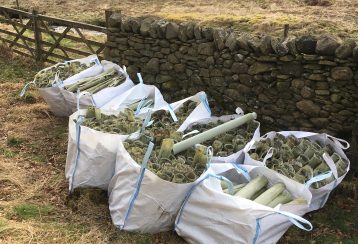The responsible disposal of plastic tree guards has been a hot topic in the forestry sector for some time, now thanks to the launch of a unique collection and recycling programme, Tubex has come up with an innovative solution to provide a simple process for the safe and efficient recycling of its market leading tree shelters. James Taylor, Marketing Director EMEIA – Specialties at Berry Global, explains.
The latest environmental commitment by Tubex, The Collection and Recycling Programme, has been developed, and is operated, exclusively in collaboration with key distributors.
Under the scheme, any purchaser of Tubex tree shelters looking to remove and dispose of them, can request to join the programme. They will be able to order bulk sacks for storing the shelters once removed, ready for them to be collected and transferred to one of Berry Group’s recycling facilities.
Once at the facility, the tree shelters will be washed and recycled into Polypropylene (PP) pellets. The material will either be used by Berry Global to manufacture new tree shelters, or in re-used in other businesses within the Group.

A commitment to a circular economy
Tree shelters have been protecting and helping new plantations thrive for over 40 years, resulting in over 13 million tree saplings being saved each year in the UK alone.
The exciting new initiative developed by Tubex, will not only create a circular economy for the company’s tree shelters, where materials never become waste, it will, at the same time, reinforce its commitment to zero landfill.
As a leading name in the manufacture of tree guard solutions and the market leader in the UK and Europe, Tubex is continuously working to increase the use of recycled materials in the manufacturing process. The company’s tree shelters already include up to 30% recycled Polypropylene (PP) pellets, whereas the brand’s market leading netting range is made from 100% recycled polymer.
And in the latest phase of its pioneering product development, the company is also running a new innovative pilot scheme with a new Biodegradable & Compostable Tree Shelter – marking the latest environmental pledge by Tubex, and ushering in a new era of sustainable tree growth.
It is just the latest environmental commitment by Tubex, with the company already operating a low-emission manufacturing process, that produces just 0.44kg of carbon emissions per tree shelter produced. This is particularly pertinent, given that each tree planted has the potential to capture 2,900KG of CO2.
The protection of tree shelters
With UK tree planting rates expected to rise sharply in the coming years thanks to numerous government, voluntary and private sector initiatives aimed at mitigating the effects of climate change, tree guards will have a pivotal role to play in establishing and nurturing new trees.
The Committee on Climate Change (CCC) recommends 30,000 hectares (116 square miles) of woodland should be planted annually until 2050, more than double the new trees planted in 2018[1]. This is equivalent to filling more than 46,000 standard football pitches or a space about three-quarters the size of the Isle of Wight every year[2].
By providing an enhanced growing environment and optimum microclimate of light, heat, CO2 and moister for saplings, that is advantageous to improved plant growth, tree shelters increase plant survival rates significantly.
Such is the positive impact of tree shelters that from all 75 million trees planted in the UK in 2019, Tubex tree shelters saved millions of saplings[3] that wouldn’t have survived without tree shelters. What’s more, the growth of plants is significantly accelerated in a tree shelter compared to trees grown in tree nets or in nature.
In addition to creating an optimal growth environment, the structure of plastic shelters also provides individual protection from browsing animals. Without them saplings simply would not survive many browsing animals such as rabbits, voles and mice, which are highly prevalent across the UK. This increased plant survival rates means less initial stock needs to be purchased and planted, a clear environmental and overall cost benefit.
For more information about Tubex’s market leading tree guard products, or to find out more about The Tubex Collection & Recycling Programme, visit: https://tubex.com/tubex-collection-and-recycling-programme/
[1] https://www.bbc.co.uk/news/uk-england-47541491
[2] https://www.bbc.co.uk/news/uk-england-47541491
[3] Based on internal estimates

